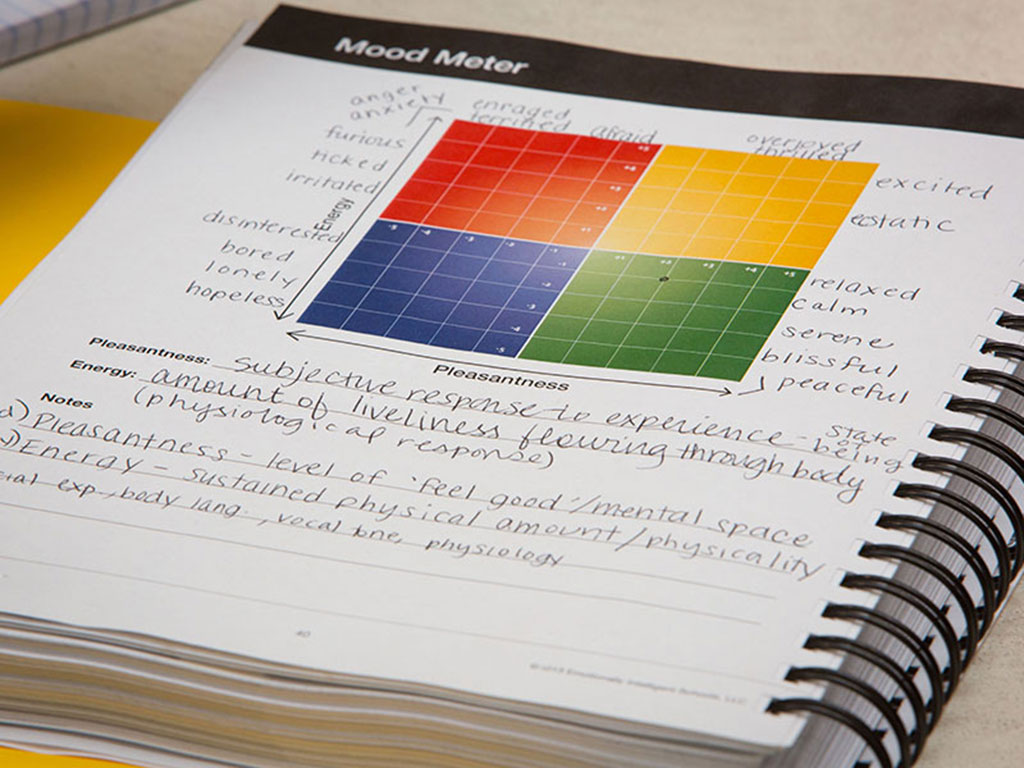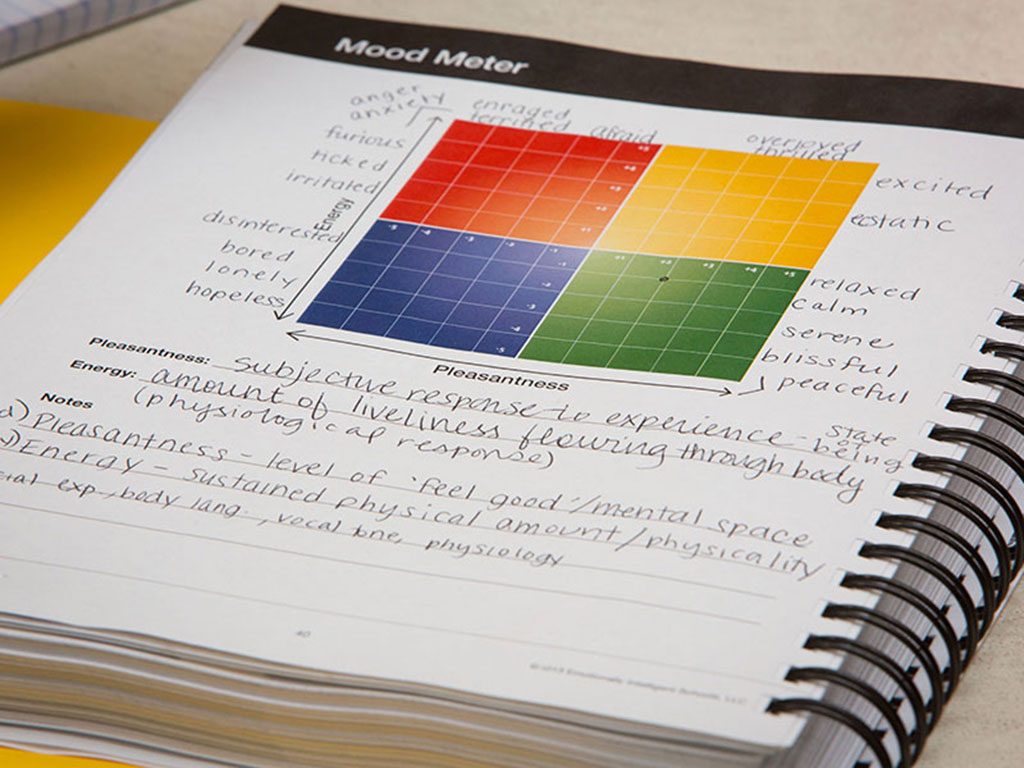
Feelings are complicated. On one hand, we’re supposed to understand what triggers them. On the other, we’re not supposed to let them create obstacles in our lives. It’s an impossible ask: Have your feelings, but don’t react to them. This is why we need emotional intelligence.
Emotional Intelligence Definition
Emotional intelligence (a.k.a. emotional quotient or EQ) is the ability to understand and manage your own emotions, and to understand other people’s emotions and your reaction to them. Have you ever been upset with someone but didn’t know how to explain it, so you let it go but stayed mad for days? Has a simple compliment ever made you cry? Did you wonder why you were having these feelings?
Understanding yourself and others is not a skill we are born with; it’s learned. These core principles are the road map for improving your EQ:
- Develop self-awareness, or recognition of your emotions.
- Take responsibility for your emotions. Be flexible in the situation causing them.
- Have empathy for other people. Try to recognize and understand their emotions.
- Use your awareness, self-regulation, and empathy to build more meaningful relationships with others.
The Benefits of Emotional Intelligence
Like any skill, building your EQ takes a lot of practice … a lifetime, in fact. But the benefits are immeasurable. It not only provides a deeper understanding of yourself and others, but it can also put your career on a more successful path, improve your home life, and have far-reaching advantages for your community.
Mastering your feelings gives you an advantage in the workplace, both in everyday situations and extreme ones. In his new book on emotional intelligence, Permission to Feel, Yale professor Marc Brackett cited one of his studies about the most capable workers and burnout at work. He and his colleagues found that those highly engaged workers were taking on more work without voicing their feelings of stress, and it caused them to have physical and mental burnout symptoms more quickly. If those workers felt like they could express their authentic emotions to their supervisors, then they would be able to work at a highly engaged level longer.
And a 2019 Inc. magazine article, “This Is the Most In-Demand Skill of the Future”, points to the growing importance of EQ in the business world: “As the world fills with more sophisticated AI and ubiquitous technology, human skills—compassion, empathy, etc.—will define the competitive edge of workers and entire organizations.”
A History of Emotional Intelligence
While the existence (and value) of emotional intelligence is widely accepted today, the concept only saw its first academic paper in 1990. Peter Salovey of Yale University and John Mayer of the University of New Hampshire were friends and colleagues who studied emotions. They noticed that of all the academic studies about intelligence, none of them took emotions into account in a measurable way.
They joined forces, and in 1990 released a landmark paper titled “Emotional Intelligence”. It defined the concept and laid the groundwork for how to use it to improve our lives. Salovey and Mayer concluded with this hope for its practical application: “In the end, by recognizing the contribution of emotional intelligence to a healthy personality, and how to foster it, we may come to recognize advantageous qualities or needed changes in social institutions and cultural practices.”
In the early 1990s, Daniel Goleman was a science writer at The New York Times when he heard about Salovey and Mayer’s work. His 1995 bestselling book, Emotional Intelligence: Why It Can Matter More than IQ, brought EQ out of academia and into the mainstream. It was a revelation to readers: Being successful depended greatly on emotion skills, not just professional ones.
The Yale Center for Emotional Intelligence
Salovey continued to explore EQ and publish studies at Yale. He founded the Health, Emotion and Behavior Laboratory, which later led to the creation of the Yale Center for Emotional Intelligence. Founded and currently directed by Brackett, the YCEI has big goals: “We conduct research and design educational approaches that support people of all ages in developing emotional intelligence and the skills to thrive and contribute to society. We do this work because the well-being and sustainability of our society depends on each of us using our emotions intelligently.”
With Brackett’s leadership, the Center has the programs to meet those goals. The YCEI partners with pre-K to12th grade teachers to incorporate EQ programs into the classroom where they’ve seen measurable academic improvement. They’re bringing a similar approach to the workplace, partnering with the Faas Foundation to launch a study into how office culture affects employees’ well-being. Today’s YCEI is fulfilling Salovey and Mayer’s original hopes—using their research to affect real-world, societal change.
More About Permission to Feel by Marc Brackett, Ph.D.
By now, you may be thinking about your own EQ, and wondering how it can improve your life and your relationships. Subtitled “Unlocking the power of emotions to help our kids, ourselves, and our society thrive,” Brackett’s book has condensed the work of the YCEI into a formula that anyone can learn. His tested R.U.L.E.R. method is what gives us permission to feel so we can be more content and successful. The process:
- Recognizing emotions is an important first step, and a simple Mood Meter chart in the book provides a quick check-in: Is your energy low or high? Do you feel more or less pleasant? It will help you read others’ emotions as well—a skill we are losing, thanks to the distance created by electronics.
- Understanding emotions comes next, answering the single question, “Why do I feel this way?”
- Labeling our emotions legitimizes them and opens the door to empathy and connecting with others.
- Expressing our feelings may be the most daunting of all, because it’s the moment you open yourself to criticism or rejection.
- Regulating our emotions is the final and most difficult step to master, but it’s the one that lets us truly own our feelings and grow beyond them.
Backed by decades of research, Permission to Feel is full of fascinating classroom and workplace success stories, along with facts about how stress and joy affect us biologically and as a society. The message: We have it in our power to be better and do better, just by paying attention to our emotions.



